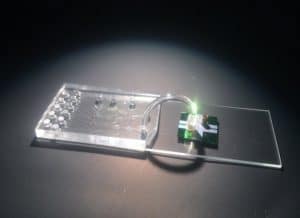Podcast: Play in new window | Download (Duration: 9:48 — 22.8MB)
Subscribe: Apple Podcasts | TuneIn | RSS | More

A collaboration of scientists including Texas Biomedical Research Institute’s Professor Jean Patterson, Ph.D., are working on a new way to detect Zika virus that will help guide clinicians in their treatment of patients with the disease. The new technology will screen bodily fluids such as blood, urine or semen, for the presence of the virus. The experimental diagnostic tool will also help pinpoint the stage of the disease in those infected.
Researchers at the University of California at Santa Cruz, Brigham Young University, and the University of California at Berkeley developed the technology that is now being tested to see if it is effective. Electrical engineering Professor Holger Schmidt, Ph.D., of UC Santa Cruz is one of the leading researchers testing the technology, which he describes as “a lab on a chip.”
Texas Biomed’s role in this scientific advancement is to provide knowledge about the virus and viral material to the team of researchers.
“What this technology will do is tell us, first of all, if you’ve already been infected,” Dr. Patterson explained. “If you have antibodies, you wouldn’t be at risk for a new infection. It will also tell us where you are in your infection.”
Knowing the stage of the disease is critical since many antivirals only work early in infections and are not effective later in the course of the disease. This particular diagnostic test would tell clinicians if the patient is showing a sign of recent infection or if the disease has progressed.
The mosquito-borne illness was first identified in Uganda in 1947, but Zika roared into international headlines in 2014 when cases of the virus in Brazil were shown to have a connection to devastating birth defects in babies born to mothers who had Zika while pregnant.
The study into a new diagnostic technology to pinpoint Zika started two years ago. Patterson is confident her work will contribute to more effective diagnostics.
“We’ve got this,” Patterson stated.
The same test is being developed for another pathogen Texas Biomed researches: Ebola virus. Dr. Schmidt is hopeful this technology would be helpful for people in remote areas affected by Ebola, such as parts of Africa.
The collaboration of scientists working on the project have applied for another scientific grant and they plan to apply for a grant to commercialize the experimental Zika test.